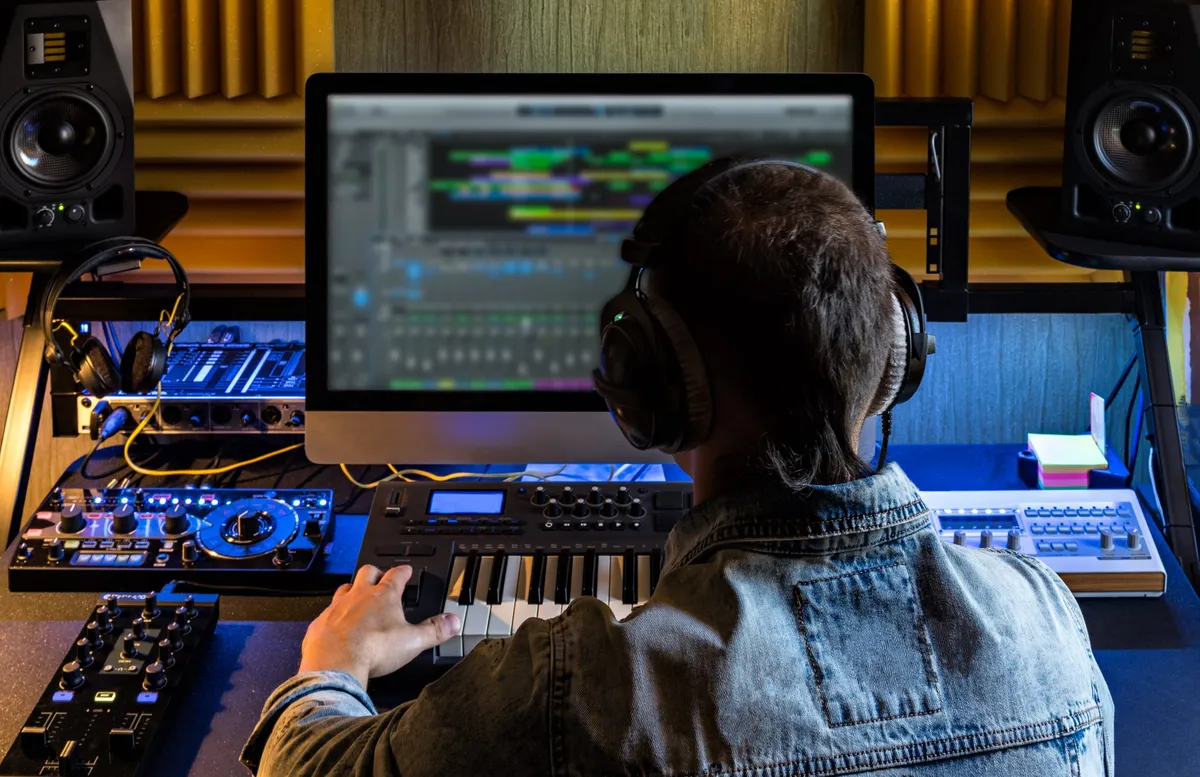Welcome to TacticInvest, where we navigate the harmonious realm of music investments to uncover the top ten opportunities awaiting savvy investors like you. In a world where the power of sound transcends boundaries, the music industry stands as a beacon of innovation and profitability. Whether you’re a passionate music enthusiast or a shrewd investor seeking lucrative ventures, our guide will illuminate the path to success in this dynamic sector.
Join us as we delve into the multifaceted landscape of music investments, where streaming services redefine the way we access melodies, live events create unforgettable experiences, and technology continues to shape the future of music creation and distribution. From securing rights to timeless classics to championing emerging artists, the opportunities in this industry are as diverse as the melodies that resonate within it.
At TacticInvest, we equip you with the knowledge and insights needed to capitalize on these opportunities effectively. Our expert analysis, comprehensive research, and strategic guidance empower you to make informed investment decisions that align with your financial goals and aspirations. Whether you’re looking to diversify your portfolio or embark on a new venture, TacticInvest is your trusted partner in unlocking the wealth of possibilities within the music industry.
So, why wait? Join us on this melodic journey as we explore the top ten investment opportunities in the music industry and invest in the power of sound with confidence and precision. With TacticInvest by your side, the symphony of success awaits.
| Investment Opportunity | Description |
| Music Streaming Services | Dominant players like Spotify, Apple Music, and Amazon Music offer growth potential with subscription-based models. |
| Music Rights and Royalties | Acquiring publishing rights, song copyrights, or artist catalogs can provide steady income over time. |
| Live Music Events | Investment in event production companies, venues, or festivals offers growth potential, especially post-pandemic. |
| Music Equipment and Technology | Companies producing instruments, recording equipment, and software drive demand with innovative audio solutions. |
| Artist Development and Management | Investing in talent agencies or management companies can yield high returns with successful artist representation. |
| Merchandising and Brand Partnerships | Companies specializing in artist merchandising or brand collaborations offer opportunities for revenue growth. |
| Music-related Real Estate | Investing in properties like recording studios or live music venues can provide rental income and appreciation. |
| Emerging Technologies | Keep an eye on blockchain for royalty transparency, VR for immersive experiences, and AI for music composition. |
| Music Education | Invest in music schools, online platforms, or educational content creators to tap into the demand for music training. |
| Music Licensing and Sync Deals | Companies facilitating music licensing for ads, films, and games present lucrative investment targets. |
Music streaming services
In an era where technology reigns supreme and the digital landscape evolves at breakneck speed, one industry stands out for its remarkable transformation: music streaming. With the advent of platforms like Spotify, Apple Music, and Amazon Music, the way we consume music has undergone a seismic shift, propelling streaming services to the forefront of the music industry.

Gone are the days of physical CDs and cumbersome downloads; today, music lovers can access millions of songs with just a few taps on their smartphones or clicks on their computers. This unprecedented accessibility has not only revolutionized the way we listen to music but has also paved the way for a new era of investment opportunities.
Investing in music streaming platforms or companies that support them has emerged as a lucrative prospect for astute investors looking to capitalize on the digital revolution. The allure of these investments lies in the exponential growth of subscription-based models, which have become the cornerstone of revenue generation for streaming services.
Take Spotify, for example, the undisputed leader in the streaming space. With over 350 million active users worldwide, including 165 million premium subscribers, Spotify has firmly established itself as the go-to destination for music aficionados seeking on-demand access to their favorite tunes. Similarly, Apple Music boasts an impressive subscriber base of over 80 million, while Amazon Music continues to gain traction with its seamless integration into the e-commerce giant’s ecosystem.
But what makes investing in music streaming services so appealing? For starters, the recurring revenue model inherent to subscription-based platforms offers a steady stream of income, providing investors with a level of predictability often lacking in other industries. Furthermore, as streaming services continue to expand their offerings to include podcasts, exclusive content, and personalized recommendations, they are poised to capture an even larger share of the digital entertainment market.
Beyond the allure of established players like Spotify, Apple Music, and Amazon Music, there are also opportunities to invest in companies that support the infrastructure of the streaming ecosystem. From technology providers specializing in audio compression algorithms to marketing agencies that help artists gain visibility on streaming platforms, the ecosystem surrounding music streaming is ripe with investment potential.
Of course, like any investment, there are risks to consider when diving into the world of music streaming. Competition is fierce, with new players entering the market and existing giants constantly innovating to stay ahead. Regulatory challenges, licensing agreements, and the ever-present threat of piracy also loom large, posing potential hurdles to sustained growth.
However, for those willing to navigate these challenges with careful consideration and strategic foresight, the rewards can be substantial. As the digital revolution continues to reshape the music industry, investing in streaming services represents not only an opportunity to profit from the power of sound but also a chance to be a part of a transformative movement that is shaping the way we experience music in the digital age.
Music rights and royalties
In the intricate tapestry of the music industry, where melodies intertwine with lyrics to create timeless compositions, lies a hidden treasure trove of investment opportunities: music rights and royalties. Often overshadowed by the glitz and glamour of the performing stage, these intangible assets offer a pathway to a steady stream of income over time, making them an attractive prospect for astute investors seeking to diversify their portfolios.

At its core, investing in music rights and royalties entails acquiring ownership or licensing rights to musical compositions, thereby entitling the investor to a share of the revenue generated from their use. This can encompass a wide range of assets, including publishing rights, song copyrights, and entire catalogs of well-known artists’ works.
One of the most enticing aspects of investing in music rights and royalties is the potential for passive income. Unlike traditional investments that may require active management or monitoring, music rights and royalties can generate revenue in perpetuity, with minimal ongoing effort required from the investor. Whether a song is played on the radio, featured in a film, or streamed on a digital platform, its creators and rights holders are entitled to royalties, creating a reliable income stream that can weather economic fluctuations and market downturns.
For investors looking to dip their toes into this lucrative market, there are various avenues to explore. One option is to invest directly in publishing rights or song copyrights, either through acquisitions or partnerships with established rights holders. This approach allows investors to build a diversified portfolio of musical assets, potentially spanning multiple genres, artists, and geographic regions.
Alternatively, investors can opt to invest indirectly through specialized investment funds or companies that focus on acquiring and managing music rights and royalties. One such example is Kobalt, a leading music services company that offers rights management, publishing, and royalty collection services to artists and rights holders worldwide. Another notable player in this space is Hipgnosis Songs Fund, a publicly traded investment trust that acquires and manages catalogs of songs from some of the world’s most iconic artists.
The appeal of investing in music rights and royalties extends beyond the promise of financial returns. For many investors, there is a sense of cultural significance and historical preservation associated with owning a piece of musical history. From timeless classics that have shaped the soundtrack of our lives to contemporary hits that capture the zeitgeist of the moment, investing in music rights and royalties allows investors to become custodians of artistic legacies, ensuring that these works continue to resonate with audiences for generations to come.
Of course, like any investment, there are risks to consider when venturing into the world of music rights and royalties. Fluctuations in consumer preferences, changes in technology and media consumption habits, and legal disputes over intellectual property rights are just a few of the factors that can impact the value and profitability of musical assets. However, with careful due diligence and a strategic approach to portfolio management, investors can mitigate these risks and position themselves for long-term success in this dynamic and rewarding market.
In conclusion, investing in music rights and royalties offers a unique opportunity to harness the power of music as a source of both financial gain and cultural enrichment. Whether through direct acquisitions, partnerships with industry players, or investment in specialized funds, savvy investors can tap into the enduring appeal of musical compositions and build a portfolio that harmonizes with their financial goals and personal passions.
Live music events
In the symphony of life, few experiences rival the exhilaration of live music events. From the pulsating energy of stadium concerts to the intimate vibes of local venues, live music has an undeniable power to captivate audiences and create memories that last a lifetime. Despite occasional setbacks such as the COVID-19 pandemic, live music events continue to stand as a beacon of resilience and creativity in an ever-changing world, offering investors a harmonious blend of opportunity and growth.

Indeed, investing in live music events is more than just a financial endeavor; it’s a chance to be part of an immersive cultural phenomenon that transcends borders and unites people from all walks of life. Whether you’re drawn to the electrifying atmosphere of music festivals, the prestige of iconic concert venues, or the behind-the-scenes magic of event production companies, there are myriad avenues to explore in this dynamic and vibrant sector.
One of the most compelling aspects of investing in live music events is the potential for exponential growth. Despite the temporary setbacks caused by the COVID-19 pandemic, the live music industry has shown remarkable resilience, with audiences eagerly returning to concerts and festivals as restrictions ease. In fact, according to a report by Pollstar, global concert ticket sales rebounded to nearly $10 billion in 2021, signaling a robust recovery for the live music sector.
For investors looking to capitalize on this rebound, there are numerous opportunities to consider. Event production companies, for example, play a crucial role in bringing live music experiences to life, handling everything from stage design and lighting to artist management and ticket sales. By investing in these companies, investors can gain exposure to the entire spectrum of live music events, from small-scale gigs to large-scale festivals.
Similarly, investing in concert venues offers a unique opportunity to tap into the enduring appeal of live music. Iconic venues like Madison Square Garden in New York City, the O2 Arena in London, and the Hollywood Bowl in Los Angeles have become synonymous with live music culture, attracting top-tier artists and loyal audiences alike. By acquiring ownership stakes in these venues or investing in companies that operate them, investors can position themselves to benefit from the steady stream of revenue generated by ticket sales, concessions, and merchandise.
Music festivals, too, represent a lucrative investment opportunity in the live music space. From Coachella and Glastonbury to Tomorrowland and Ultra Music Festival, festivals have evolved into immersive cultural experiences that draw hundreds of thousands of attendees from around the world. By investing in festival organizers or sponsoring specific events, investors can gain exposure to the booming festival market and capitalize on the growing demand for unique and memorable live music experiences.
Of course, investing in live music events is not without its challenges. Market volatility, regulatory hurdles, and unforeseen disruptions such as the COVID-19 pandemic can all impact the profitability of investments in this sector. However, for those willing to weather the occasional storm, the rewards can be substantial. By aligning with reputable partners, conducting thorough due diligence, and diversifying their portfolios, investors can mitigate risks and position themselves for long-term success in the dynamic and ever-evolving world of live music events.
In conclusion, investing in live music events offers a rare opportunity to blend passion with profit, as investors participate in the creation of unforgettable experiences that resonate with audiences around the world. Whether through event production companies, concert venues, or music festivals, there are myriad ways to tap into the thriving live music sector and reap the rewards of its enduring popularity. As the rhythm of live music continues to reverberate across stages and stadiums worldwide, savvy investors have a chance to join the chorus and enjoy the sweet sound of success.
Music licensing and sync deals
In the ever-evolving landscape of the music industry, where melodies meet motion pictures and harmonies synchronize with storytelling, lies a hidden goldmine of opportunity: music licensing and sync deals. Far beyond the realms of record sales and concert tours, this often-overlooked segment of the industry offers investors a pathway to lucrative returns by capitalizing on the intersection of music and media.

At its core, music licensing involves granting permission for the use of musical compositions in various forms of media, including advertisements, films, TV shows, and video games. From catchy jingles that accompany television commercials to epic soundtracks that enhance the drama of blockbuster movies, licensed music plays a vital role in shaping the emotional landscape of visual storytelling.
For investors, the appeal of music licensing and sync deals lies in their potential to generate substantial revenue streams from the exploitation of intellectual property rights. Companies that specialize in facilitating these deals or own extensive catalogs of licensable music stand to benefit from a diverse range of income sources, including upfront licensing fees, royalties from usage, and revenue-sharing agreements with content creators.
One of the most attractive aspects of investing in music licensing and sync deals is the resilience of demand across various media platforms. In an era dominated by digital content consumption, the need for high-quality music to complement visual content has never been greater. Whether it’s a brand seeking the perfect soundtrack for a marketing campaign or a filmmaker looking to evoke a specific mood in a scene, the demand for licensed music is virtually insatiable.
Moreover, the globalization of media distribution channels has opened up new opportunities for music licensing on a global scale. With streaming platforms like Netflix, Hulu, and Amazon Prime expanding their reach to international markets, there is a growing demand for diverse and culturally relevant music to accompany content tailored to specific audiences worldwide. This presents an opportunity for investors to capitalize on the global appetite for licensed music and tap into emerging markets with untapped potential.
Investing in companies that specialize in music licensing and sync deals offers investors exposure to a diverse portfolio of assets with the potential for long-term growth. From established players with extensive catalogs of classic hits to up-and-coming startups that focus on emerging artists and niche genres, there are myriad opportunities to diversify and maximize returns in this dynamic sector.
One such example is the rise of music licensing platforms and marketplaces, which connect content creators with rights holders in a streamlined and efficient manner. Companies like Epidemic Sound, Audio Network, and Artlist have disrupted the traditional music licensing model by offering subscription-based services that provide access to a vast library of high-quality music for a flat fee. By investing in these platforms, investors can capitalize on the growing demand for affordable and accessible music licensing solutions in the digital age.
Of course, like any investment, there are risks to consider when venturing into the world of music licensing and sync deals. Market competition, changes in consumer preferences, and legal challenges related to copyright infringement are just a few of the factors that can impact the profitability of investments in this sector. However, with careful due diligence and a strategic approach to portfolio management, investors can mitigate these risks and position themselves for success in this dynamic and rewarding market.
In conclusion, investing in music licensing and sync deals offers a unique opportunity to blend passion with profit, as investors participate in the creation of memorable experiences that resonate with audiences around the world. Whether through established companies with extensive catalogs or innovative startups that are reimagining the industry, there are myriad ways to tap into the lucrative world of music licensing and sync deals and reap the rewards of its enduring popularity. As the demand for high-quality music in visual content continues to soar, savvy investors have a chance to orchestrate their own symphony of success in this vibrant and evolving sector.
Music equipment and technology
In the ever-evolving landscape of the music industry, where creativity meets technology, lies a realm of opportunity for investors: music equipment and technology. From traditional instruments to cutting-edge software solutions, companies that produce tools used in music creation are not only driving innovation but also generating substantial returns for savvy investors who recognize the transformative power of sound.

At the heart of this burgeoning sector are companies that manufacture musical instruments, recording equipment, software, and other technology designed to enhance the music creation process. From iconic brands like Fender and Gibson, renowned for their guitars and amplifiers, to pioneers in digital audio workstations (DAWs) such as Ableton and Pro Tools, the range of investment opportunities in this space is as diverse as the sounds they produce.
One of the most compelling reasons to invest in music equipment and technology is the enduring demand for high-quality tools among musicians, producers, and audio professionals. Despite fluctuations in consumer spending and economic downturns, the desire to create and innovate remains constant, driving sustained demand for innovative products that enable artists to bring their musical visions to life.
Moreover, the rapid pace of technological advancement has opened up new frontiers in music creation, giving rise to a wave of innovative products and solutions that cater to the evolving needs of modern musicians. Virtual instruments, for example, allow artists to access a vast array of sounds and textures with just a few clicks, eliminating the need for expensive hardware and cumbersome setups. Similarly, advancements in audio production tools, such as artificial intelligence-powered plugins and machine learning algorithms, are revolutionizing the way music is recorded, mixed, and mastered.
Investing in companies that lead the charge in music equipment and technology offers investors exposure to a dynamic and rapidly growing market with the potential for substantial returns. Whether it’s established players with a track record of success or up-and-coming startups that are pushing the boundaries of innovation, there are myriad opportunities to capitalize on the demand for cutting-edge products and solutions in this space.
One such example is the rise of subscription-based software models, which offer musicians and producers access to a comprehensive suite of tools and resources for a flat monthly fee. Companies like Native Instruments, Splice, and Slate Digital have disrupted the traditional model of software licensing by offering affordable and flexible subscription plans that cater to the needs of creators at every skill level.
Another area of opportunity lies in the convergence of music equipment and technology with other industries, such as gaming, virtual reality (VR), and augmented reality (AR). As interactive experiences become increasingly popular among consumers, there is a growing demand for immersive audio solutions that enhance the gaming and entertainment experience. By investing in companies that specialize in audio hardware and software for gaming and VR/AR applications, investors can tap into a rapidly expanding market with significant growth potential.
Of course, like any investment, there are risks to consider when venturing into the world of music equipment and technology. Market competition, technological obsolescence, and changing consumer preferences are just a few of the factors that can impact the profitability of investments in this sector. However, with careful due diligence and a strategic approach to portfolio management, investors can mitigate these risks and position themselves for success in this dynamic and fast-paced industry.
In conclusion, investing in music equipment and technology offers a unique opportunity to capitalize on the intersection of creativity and innovation in the music industry. Whether through established companies with a legacy of excellence or emerging startups that are pushing the boundaries of what’s possible, there are myriad ways to tap into the profit potential of this vibrant and dynamic sector. As technology continues to reshape the way music is created, produced, and consumed, savvy investors have a chance to tune into the rhythm of innovation and reap the rewards of its enduring popularity.
Artist development and management
In the ever-evolving world of the music industry, where talent meets opportunity, lies a realm of investment ripe with potential: artist development and management. Behind every chart-topping hit and sold-out concert lies a team of dedicated professionals who specialize in nurturing talent and guiding artists’ careers to new heights. For investors with an eye for talent and a passion for music, investing in artist management companies or agencies represents an exciting opportunity to not only support the next generation of musical superstars but also to reap significant financial rewards.

At the heart of artist development and management are companies and agencies that specialize in identifying, nurturing, and promoting talented artists. From scouting raw talent in local music scenes to orchestrating global marketing campaigns and strategic partnerships, these entities play a pivotal role in shaping the careers of artists and helping them achieve their full potential.
One of the most compelling reasons to invest in artist development and management is the potential for high returns if successful. By backing the right talent and providing the necessary resources and support, artist management companies have the opportunity to break new acts and elevate established artists to even greater heights of success. From securing record deals and booking lucrative tours to negotiating endorsement deals and licensing agreements, the revenue streams available to successful artist management companies are diverse and abundant.
Moreover, the rise of digital and social media platforms has democratized the music industry, allowing artists to reach audiences directly and cultivate fan bases without the need for traditional gatekeepers. For investors, this presents an opportunity to capitalize on the growing demand for artist management services and leverage the power of technology to amplify the reach and impact of their investments.
Investing in artist development and management also offers a unique opportunity to play a hands-on role in shaping the future of music. By partnering with experienced professionals who have a proven track record of success in discovering and nurturing talent, investors can contribute to the growth and success of artists and help bring their creative visions to life.
One example of a successful artist management company is Roc Nation, founded by music mogul Jay-Z. With a roster that includes some of the biggest names in music, including Rihanna, J. Cole, and Meek Mill, Roc Nation has established itself as a powerhouse in the industry, breaking new ground and setting new standards for artist development and management.
Another notable example is Maverick Management, whose clients range from pop icons like Britney Spears and Madonna to rising stars like Halsey and Khalid. With a focus on innovative marketing strategies and personalized career development plans, Maverick Management has earned a reputation for its ability to identify and nurture talent across a wide range of genres and styles.
Of course, like any investment, there are risks to consider when venturing into the world of artist development and management. Success in this field requires not only a keen eye for talent but also a deep understanding of the ever-changing dynamics of the music industry. Market volatility, shifting consumer preferences, and the unpredictable nature of artistic creativity are just a few of the factors that can impact the success of artist management ventures.
However, for investors willing to navigate these challenges with patience and perseverance, the rewards can be significant. By partnering with experienced professionals who have a proven track record of success, investors can gain access to a diverse range of revenue streams and position themselves for long-term growth and profitability in the dynamic and fast-paced world of artist development and management.
In conclusion, investing in artist development and management offers a unique opportunity to support the next generation of musical talent while also reaping significant financial rewards. Whether through established companies with a track record of success or emerging startups that are pushing the boundaries of creativity and innovation, there are myriad ways to tap into the profit potential of this vibrant and dynamic sector. As the music industry continues to evolve and adapt to new challenges and opportunities, savvy investors have a chance to play a meaningful role in shaping its future and reaping the rewards of its enduring popularity.
Music education
In the rich tapestry of human experience, few endeavors evoke the depth of emotion and expression quite like music. From the haunting melodies of a classical symphony to the infectious rhythms of a jazz improvisation, music has the power to inspire, uplift, and transform lives. It’s no wonder, then, that the demand for music education and training remains steadfast, offering investors a harmonious opportunity to tap into a market fueled by passion and creativity.

At the heart of the music education sector are institutions and platforms that cater to aspiring musicians, hobbyists, and enthusiasts alike. Whether it’s traditional brick-and-mortar music schools, online learning platforms, or educational content creators, these entities play a vital role in nurturing talent, fostering creativity, and instilling a lifelong love of music in learners of all ages.
One of the most compelling reasons to invest in music education is the enduring demand for high-quality instruction and resources. Despite shifts in technology and changes in consumer behavior, the desire to learn and master musical skills remains constant, driving sustained demand for educational programs and materials that cater to a wide range of interests and skill levels.
Investing in music schools offers a unique opportunity to support the next generation of musicians while also reaping financial rewards. Whether it’s a prestigious conservatory that trains virtuosos for the world stage or a community music school that provides affordable lessons to aspiring amateurs, music schools serve as hubs of creativity and inspiration, enriching communities and shaping the cultural landscape.
Similarly, investing in online learning platforms presents an opportunity to capitalize on the growing trend of digital education and remote learning. With the rise of smartphones, tablets, and high-speed internet access, learners have unprecedented access to a wealth of educational resources and opportunities, regardless of their geographical location or socioeconomic background. By investing in platforms that offer comprehensive music education curricula, interactive learning tools, and personalized instruction, investors can tap into a global market of learners hungry for knowledge and skill development.
Another avenue for investment lies in supporting educational content creators who produce engaging and informative materials for students and teachers alike. Whether it’s instructional videos, interactive tutorials, or digital sheet music libraries, content creators play a crucial role in democratizing access to music education and making learning more engaging and accessible for learners of all ages and abilities.
One example of a successful music education platform is Berklee Online, the online extension school of Berklee College of Music. With a diverse range of certificate programs, degree programs, and individual courses, Berklee Online offers high-quality instruction in music production, songwriting, performance, and more, attracting students from around the world who are eager to hone their skills and pursue their passion for music.
Similarly, platforms like Skillshare and Udemy offer a wide range of music-related courses taught by industry professionals, covering topics such as music theory, composition, and audio engineering. By investing in these platforms, investors can gain exposure to a rapidly growing market of self-directed learners who are seeking affordable and accessible ways to improve their musical skills and knowledge.
Of course, like any investment, there are risks to consider when venturing into the world of music education. Market competition, changes in technology, and shifts in consumer preferences are just a few of the factors that can impact the success of educational ventures. However, with careful due diligence and a strategic approach to portfolio management, investors can mitigate these risks and position themselves for long-term growth and profitability in this dynamic and resilient market.
In conclusion, investing in music education offers a unique opportunity to support the arts while also reaping significant financial rewards. Whether through traditional music schools, online learning platforms, or educational content creators, there are myriad ways to tap into the thriving market of music education and make a meaningful impact on the lives of learners around the world. As the demand for high-quality instruction and resources continues to grow, savvy investors have a chance to strike the chords of opportunity and reap the rewards of its enduring popularity.
Merchandising and brand partnerships
In the dynamic world of the music industry, where creativity intersects with commerce, lies a lucrative avenue for investors: artist merchandising and brand partnerships. From iconic tour merchandise to limited edition collectibles, artists have long recognized the power of leveraging their popularity to create unique products that resonate with fans and drive revenue. By investing in companies that specialize in artist merchandising or facilitate brand partnerships within the music industry, savvy investors can tap into a market fueled by passion, loyalty, and the universal appeal of music.
At the heart of artist merchandising are companies that design, produce, and distribute a wide range of products bearing the likeness and branding of popular artists. From t-shirts and hoodies to hats, posters, and vinyl records, these products serve as tangible expressions of fandom, allowing fans to express their love for their favorite artists and connect with like-minded enthusiasts around the world.
One of the most compelling reasons to invest in artist merchandising is the potential for high profit margins and recurring revenue streams. Unlike traditional music sales, which may be subject to fluctuations in consumer demand and market trends, merchandise sales offer a more reliable source of income, driven by the unwavering loyalty and enthusiasm of fans. By investing in companies that specialize in artist merchandising, investors can gain exposure to a diverse range of products and revenue streams, from online sales and tour merchandise to licensing agreements and retail partnerships.
Similarly, investing in brand partnerships within the music industry presents an opportunity to capitalize on the power of collaboration and cross-promotion. From co-branded products and limited edition releases to sponsored events and endorsement deals, brand partnerships allow artists to extend their reach beyond the confines of the music industry and connect with new audiences in exciting and innovative ways.
One example of a successful brand partnership in the music industry is the collaboration between streetwear giant Supreme and iconic artists such as Michael Jackson, Morrissey, and Neil Young. By leveraging the cachet of these legendary artists and the cultural relevance of their music, Supreme has been able to create highly coveted and collectible products that resonate with fans of both fashion and music.
Similarly, companies like Bravado, a subsidiary of Universal Music Group, specialize in creating and distributing merchandise for some of the biggest names in music, including The Beatles, Kanye West, and Lady Gaga. By partnering with artists and their management teams to develop and market a wide range of products, Bravado has established itself as a leader in the artist merchandising space, generating significant revenue and brand recognition in the process.
Of course, like any investment, there are risks to consider when venturing into the world of artist merchandising and brand partnerships. Market competition, changes in consumer preferences, and shifts in the music industry landscape are just a few of the factors that can impact the success of investments in this sector. However, with careful due diligence and a strategic approach to portfolio management, investors can mitigate these risks and position themselves for long-term growth and profitability in this dynamic and fast-paced market.
In conclusion, investing in artist merchandising and brand partnerships offers a unique opportunity to tap into the intersection of music, fashion, and pop culture while also reaping significant financial rewards. Whether through established companies with a track record of success or emerging startups that are pushing the boundaries of creativity and innovation, there are myriad ways to capitalize on the enduring popularity of music and its ability to inspire passion and loyalty in fans around the world. As artists continue to leverage their influence to create unique and compelling products, savvy investors have a chance to amplify their success and reap the rewards of their enduring popularity.
Music-related real estate
In the intricate melody of investment opportunities, there’s a chord that strikes a harmonious balance between passion and profit: music-related real estate. From iconic recording studios to bustling live music venues, properties intertwined with the music industry offer investors a unique opportunity to blend their love for music with the potential for rental income and property appreciation. Whether it’s owning a piece of musical history or positioning oneself in prime locations for live events, music-related real estate investments can strike a lucrative note for savvy investors.

At the heart of music-related real estate are properties that cater to the needs of musicians, producers, and music enthusiasts alike. Recording studios, rehearsal spaces, and music-themed venues serve as creative hubs where artists come together to collaborate, create, and perform. By investing in these properties, investors can capitalize on the enduring demand for spaces that foster musical innovation and expression.
One of the most compelling reasons to invest in music-related real estate is the potential for both rental income and property appreciation. Recording studios and rehearsal spaces, in particular, offer a steady stream of rental income from musicians and bands seeking a professional environment to hone their craft. Additionally, owning properties in prime locations for live music events can be advantageous, as demand for event spaces and concert venues remains strong, driving rental rates and property values higher over time.
Moreover, investing in music-related real estate allows investors to immerse themselves in the vibrant culture and community of the music industry. From rubbing shoulders with up-and-coming artists to hosting exclusive events and performances, owning music-related properties offers a unique opportunity to be part of the creative process and contribute to the cultural fabric of a city or neighborhood.
One example of a successful music-related real estate investment is the iconic Electric Lady Studios in New York City. Founded by legendary musician Jimi Hendrix in 1970, Electric Lady Studios has played host to countless recording sessions for artists spanning multiple genres, from The Rolling Stones and David Bowie to Jay-Z and Adele. By preserving the historic integrity of the studio while adapting to the needs of modern artists, Electric Lady Studios has remained a coveted destination for musicians and producers seeking a unique and inspiring recording environment.
Similarly, properties located in prime locations for live music events can offer significant opportunities for investors. Whether it’s a historic theater, an intimate nightclub, or an outdoor amphitheater, owning a venue that hosts live performances can be a lucrative investment, particularly in cities with thriving music scenes and vibrant cultural communities. By capitalizing on the demand for live music experiences and providing top-notch amenities and facilities, investors can position themselves for long-term success in the dynamic and ever-evolving world of music-related real estate.
Of course, like any investment, there are risks to consider when venturing into the world of music-related real estate. Market volatility, changes in consumer preferences, and regulatory challenges are just a few of the factors that can impact the success of investments in this sector. However, with careful due diligence and a strategic approach to property acquisition and management, investors can mitigate these risks and position themselves for both short-term rental income and long-term property appreciation.
In conclusion, investing in music-related real estate offers a unique opportunity to blend passion with profit, as investors capitalize on the enduring appeal of music and its ability to inspire creativity and connection. Whether through recording studios, rehearsal spaces, or live music venues, there are myriad ways to tap into the vibrant and dynamic world of music-related real estate and reap the rewards of its enduring popularity. As the music industry continues to evolve and adapt to new challenges and opportunities, savvy investors have a chance to strike a harmonious chord and amplify their success in this thriving market.
Emerging technologies
In the ever-evolving landscape of the music industry, innovation is the key to staying in tune with the times. From blockchain to virtual reality (VR) and artificial intelligence (AI), emerging technologies are reshaping the way music is created, distributed, and experienced, offering both challenges and opportunities for artists, creators, and investors alike. As these technologies continue to mature and evolve, those who keep an eye on the horizon stand to reap the rewards of a more connected, immersive, and dynamic musical landscape.

Blockchain technology has emerged as a disruptive force in the music industry, promising to revolutionize royalty distribution and rights management. By providing a decentralized and transparent ledger of transactions, blockchain has the potential to ensure fair compensation for artists and rights holders while reducing inefficiencies and mitigating disputes over ownership and licensing. Companies like Imogen Heap’s Mycelia and Ujo Music are pioneering blockchain-based solutions for music rights management, empowering artists to take control of their intellectual property and receive instant, transparent payments for their work.
Virtual reality (VR) is another technology poised to transform the music industry, offering immersive and interactive experiences that transcend the limitations of traditional performance venues. From virtual concerts and live streaming events to interactive music videos and immersive soundscapes, VR has the potential to transport audiences to new worlds and redefine the way music is experienced. Artists like The Weeknd and Travis Scott have already embraced VR technology to create groundbreaking virtual concerts that blur the lines between reality and imagination, attracting millions of viewers and opening up new avenues for creative expression and fan engagement.
Artificial intelligence (AI) is also playing an increasingly prominent role in the music industry, with applications ranging from music composition and production to personalized recommendation algorithms. AI-powered tools like Amper Music and Jukedeck are enabling artists and creators to generate original compositions quickly and efficiently, while streaming platforms like Spotify and Apple Music use AI to analyze listener data and deliver personalized playlists and recommendations tailored to individual tastes and preferences.
One of the most exciting aspects of these emerging technologies is their potential to democratize access to music creation and consumption, empowering artists and audiences alike to explore new frontiers of creativity and expression. Whether it’s using blockchain to ensure fair compensation for artists, leveraging VR to create immersive live experiences, or harnessing AI to unlock new possibilities for music composition and discovery, the possibilities are endless for those willing to embrace innovation and adapt to the changing landscape of the music industry.
Of course, with innovation comes challenges, and the adoption of emerging technologies in the music industry is no exception. Issues such as data privacy, copyright infringement, and the digital divide must be addressed as these technologies continue to evolve and expand. However, by fostering collaboration and dialogue among artists, technologists, and industry stakeholders, we can navigate these challenges and unlock the full potential of emerging technologies to shape the future of music in a more inclusive, transparent, and accessible manner.
In conclusion, the future of the music industry is being shaped by a symphony of innovation, with emerging technologies like blockchain, VR, and AI offering new opportunities for artists, creators, and investors to push the boundaries of creativity and reimagine the way music is created, distributed, and experienced. By keeping an eye on these emerging technologies and embracing change, we can chart a course towards a more vibrant, dynamic, and equitable musical landscape where everyone has the opportunity to find their own unique voice and share it with the world.





